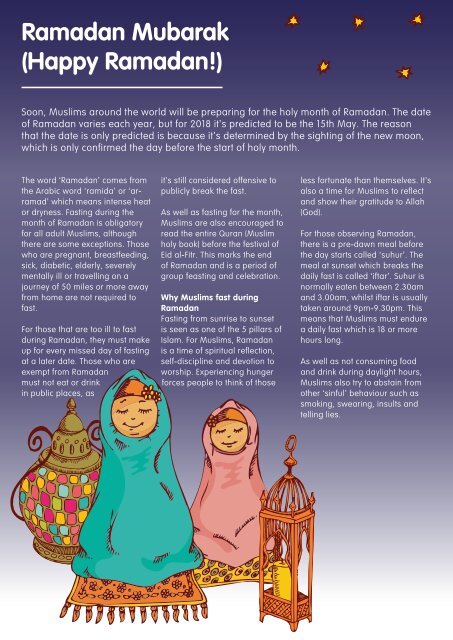Parenta Magazine May 2018
You also want an ePaper? Increase the reach of your titles
YUMPU automatically turns print PDFs into web optimized ePapers that Google loves.
Ramadan Mubarak<br />
(Happy Ramadan!)<br />
Soon, Muslims around the world will be preparing for the holy month of Ramadan. The date<br />
of Ramadan varies each year, but for <strong>2018</strong> it’s predicted to be the 15th <strong>May</strong>. The reason<br />
that the date is only predicted is because it’s determined by the sighting of the new moon,<br />
which is only confirmed the day before the start of holy month.<br />
The word ‘Ramadan’ comes from<br />
the Arabic word ‘ramida’ or ‘arramad’<br />
which means intense heat<br />
or dryness. Fasting during the<br />
month of Ramadan is obligatory<br />
for all adult Muslims, although<br />
there are some exceptions. Those<br />
who are pregnant, breastfeeding,<br />
sick, diabetic, elderly, severely<br />
mentally ill or travelling on a<br />
journey of 50 miles or more away<br />
from home are not required to<br />
fast.<br />
For those that are too ill to fast<br />
during Ramadan, they must make<br />
up for every missed day of fasting<br />
at a later date. Those who are<br />
exempt from Ramadan<br />
must not eat or drink<br />
in public places, as<br />
it’s still considered offensive to<br />
publicly break the fast.<br />
As well as fasting for the month,<br />
Muslims are also encouraged to<br />
read the entire Quran (Muslim<br />
holy book) before the festival of<br />
Eid al-Fitr. This marks the end<br />
of Ramadan and is a period of<br />
group feasting and celebration.<br />
Why Muslims fast during<br />
Ramadan<br />
Fasting from sunrise to sunset<br />
is seen as one of the 5 pillars of<br />
Islam. For Muslims, Ramadan<br />
is a time of spiritual reflection,<br />
self-discipline and devotion to<br />
worship. Experiencing hunger<br />
forces people to think of those<br />
less fortunate than themselves. It’s<br />
also a time for Muslims to reflect<br />
and show their gratitude to Allah<br />
(God).<br />
For those observing Ramadan,<br />
there is a pre-dawn meal before<br />
the day starts called ‘suhur’. The<br />
meal at sunset which breaks the<br />
daily fast is called ‘iftar’. Suhur is<br />
normally eaten between 2.30am<br />
and 3.00am, whilst iftar is usually<br />
taken around 9pm-9.30pm. This<br />
means that Muslims must endure<br />
a daily fast which is 18 or more<br />
hours long.<br />
As well as not consuming food<br />
and drink during daylight hours,<br />
Muslims also try to abstain from<br />
other ‘sinful’ behaviour such as<br />
smoking, swearing, insults and<br />
telling lies.<br />
Children and fasting<br />
Children who have not yet<br />
reached puberty (usually<br />
under the age of 14) are not<br />
required to fast during<br />
Ramadan. However,<br />
they’re encouraged to<br />
gradually start giving<br />
up some food and drink<br />
during holy month so that<br />
they’re prepared to fast fully<br />
when they reach adulthood.<br />
For children, Ramadan advent<br />
calendars are a way of keeping<br />
track of the countdown to Eid<br />
al-Fitr. These calendars are filled<br />
with toys and treats.<br />
Celebrating the end of holy<br />
month<br />
Eid al-Fitr marks the end of<br />
Ramadan, and is set to place<br />
on or around the 14th June. Like<br />
Ramadan, the exact date is<br />
confirmed nearer the time. Eid<br />
al-Fitr is a time for feasting and<br />
festivities. Friends and family will<br />
often visit each other’s houses<br />
bearing gifts.<br />
Charity, known as ‘zakat’, is a<br />
very important part of Islam and<br />
families will visit the poor and<br />
needy in their local community<br />
to ensure they have enough food<br />
and drink to celebrate Eid al-Fitr<br />
themselves.<br />
Tips on how to celebrate Eid al-Fitr in your setting:<br />
¥ ¥ Read the children stories about preparing for Eid al-Fitr<br />
¥ ¥ Make and decorate Eid cards for children to take home<br />
¥ ¥ Have a go at writing Eid Mubarak (Happy Eid)<br />
¥ ¥ Throw a party with everyone looking their best. Get everyone dancing to the beat of<br />
the Arabic music<br />
¥ ¥ Enjoy party snacks such as bhajis and samosas<br />
¥ ¥ Find out about henna patterns used to decorate ladies’ hands and feet. Draw around<br />
the children’s hands to make paper hands which they can then decorate themselves<br />
<strong>May</strong> <strong>2018</strong> 33

















